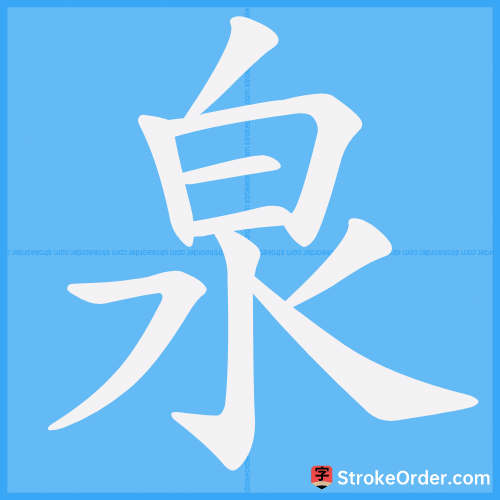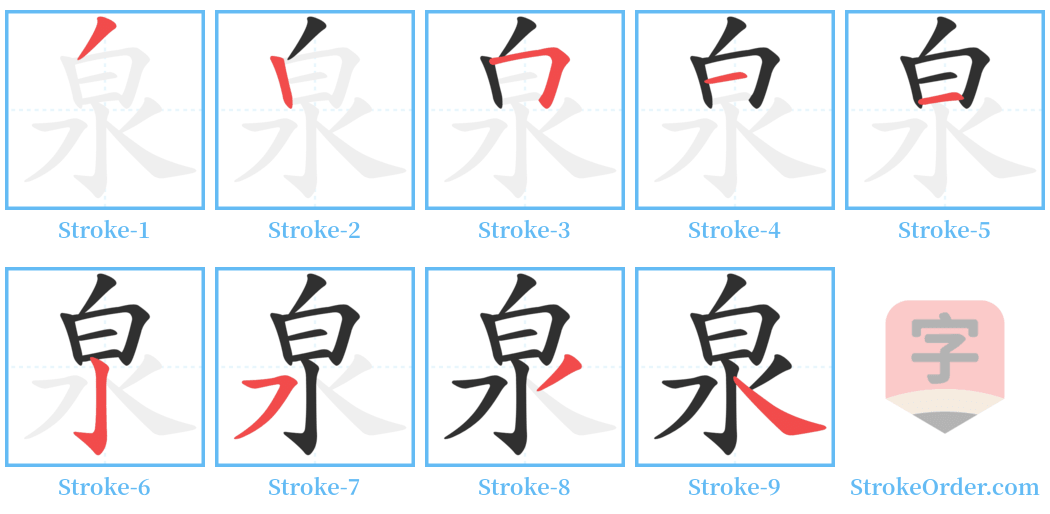泉 Stroke Order
Animated Stroke Order of 泉

Stroke Order Diagrams for 泉

Step-by-Step Handwriting Guide for 泉

Learn to Write Chinese Characters with Video Tutorials
Watch the video of writing the Chinese character "泉", learn the correct stroke order (笔顺) of the character "泉", and master the standard way of writing the character "泉".
Free Printable Handwriting Practice with Stroke Order: 泉
Printable Writing Practice Worksheet of "泉" in Portrait Orientation (Tian Zi Ge)

Printable Writing Practice Worksheet of "泉" in Landscape Orientation (Tian Zi Ge)

Information of 泉
Pinyin
quán
Radical
水
Strokes
9 strokes
Usage
★★★★★
Definition
fountain / spring
泉 [quán]
Meaning:
1. A water source that flows from underground.
2. The name for ancient coins.
3. A surname.
Extended Meanings:
1. A water source that flows from underground: spring source, waterfall, sweet spring, hot spring, spring spout, yellow spring (historically refers to the place where a person is after death, also known as "九泉").
2. The name for ancient coins.
3. A surname.
1. Same as the original meaning ([En.] spring).
2. Underground water ([En.] underground water).
3. Referring to the place where a person resides after death ([En.] dwelling place of the dead).
4. Silk currency; name for ancient coins ([En.] ancient coins).
5. Spring hole ([En.] hole of spring).
References:
1. "Shuowen Jiezi": "泉, 人原也。象水流出成川形。"
2. "The Book of Songs, Minor Odes: 如彼泉流."
3. "The Book of Songs, Major Odes: 泉之竭矣."
4. Tao Yuanming, "Return to Seclusion": 泉涓涓而始流.
5. Ouyang Xiu, "Records of the Drunken Old Man": 酿泉为酒.
6. "The music of the spring is fragrant and the wine is clear."
7. Yuan Hongdao, "Excursion to Manjing": 泉而茗者.
8. Gu Yanwu,"Record of the Rest Hut": 有泉可汲.
Examples:
- 温泉 (hot spring)
- 矿泉 (mineral spring)
- 清泉 (clear spring)
- 泉根 (spring source)
- 泉脉 (subterranean spring water)
- 泉涌 (spring water gushing)
- 泉鱼 (fish from deep pools)
- 泉绅 (spring water cascading from high mountains)
- 泉韵 (the sound of spring water)
4. Silk currency; ancient coins ([En.] ancient coins).
Examples:
- 泉儿 (general term for ancient coins)
- 泉币 (coins, currency, also called 泉货)
- 泉金 (gold coin)
- 泉布 (silk and cloth currency)
- 泉刀 (coins and knife coins)
- 泉布先生 (colloquial term for currency).
5. Spring hole ([En.] hole of spring).
References:
1. Li Bai, "Dreaming of the Celestial Mountain": 熊咆龙吟殷岩泉.
2. Wang Anshi, "Record of Climbing Mount Baozhan": 有泉侧出.
3. Ouyang Xiu, "Record of the Drunken Old Man's Pavilion": 临于泉上.
Input Method for 泉
Pinyin
quan2
Wubi
riu
Cangjie
hae
Zhengma
nkkv
Four Corner
26902
Unicode
U+6cc9
Same Pronunciation Characters